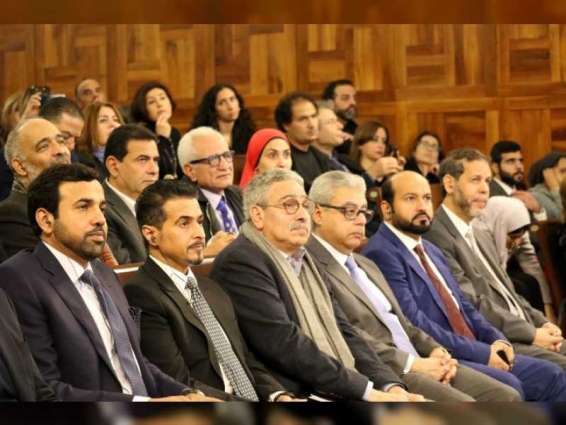SHARJAH, (Pakistan Point News - 30th Mar, 2019) Sharjah has participated in the fourth edition of ‘Arabic Language and Culture Festival’ in Milan, Italy, that is being organised by the Catholic University of the Sacred Heart,UNICATT, in strategic partnership with Sharjah Book Authority,SBA, and in collaboration with the Arabic Language Academy in Sharjah.
Held under the title "Shahrazad outside the palace", this edition of the festival, included several events like book exhibitions, cultural symposiums, poetry evenings and musical concerts, to highlight the achievements of Arab culture and language, with a specific focus on women’s contributions.
Sharjah’s participation at the festival furthers the emirate’s cultural project internationally, in line with the vision and directives of H.H. Sheikh Dr. Sultan bin Muhammad Al Qasimi, Member of the Supreme Council and Ruler of Sharjah.
Sharjah’s delegation comprised Ahmed bin Rakkad Al Ameri, Chairman of SBA; Mohammed Hassan Khalaf, Director General of Sharjah Broadcasting Authority; Dr Mohamed Safi Al Mosteghanemi, Secretary General of Arabic Language Academy in Sharjah.
Abdullah Hassan Al Shamsi, Consul General of the UAE in Milan, attended the festival, along with a host of Arab ambassadors and diplomats, Arab and Italian authors, and over 500 Italian and European students studying Arabic literature in UNICATT.
Sharjah’s presence seeked to reinforce the usage of Arabic internationally and showcase its vital role in the enrichment of human civilisation and global culture.
The festival ran alongside the Arab-Italian Book Fair on the Arab World in Milan. It addresses many questions about Arab women authors and scholars, such as when did Arab women enter the sphere of the general public in education, journalism, literature, theatre, cinema, music and art? What impact did this have on modern standard Arabic? Did it change the way women were portrayed in literature? During his speech at the opening ceremony of the festival, Ahmed Al Ameri remarked: "We are keen to introduce authentic Arab culture to the world. Celebrating the Arabic language in Milan – one of Europe’s most important educational and cultural hub – swells us with pride. The festival has been instrumental to revealing the technical, as well as aesthetic uniqueness of our mother tongue. Arabic has more than 12 Million words, and has influenced on major languages like Turkish, French, Spanish and others."
Al Ameri commended the theme of the festival that shines light on the excelling contributions of female Arab scholars and writers to literature and culture.
For his part, Mohammed Hassan Khalaf, noted: "Sharjah’s cultural project originated in the UAE, and today, spans the world. The emirate has been steadfast in its efforts to preserve and highlight its achievements through the centuries. In the Arabic language, one can trace the legacy of our ethics and identity. It is one of the biggest contributions from our world to the collective human civilisation."
Khalaf also emphasised Sharjah’s continuous efforts to promote Arabic locally and globally, citing that under the directives of the Sharjah Ruler, the emirate established the first Arabic language academy in the UAE, and offered the Arab League Educational, Cultural and Scientific Organisation,ALECSO, a grant to publish Encyclopaedia of Great Arab and Muslim Scholars and Writers.
Keynote addresses by Maria Cristina Gatti, Director of the Arabic Language Research Centre,CARA, at UNICATT; Giovanni Gobber, Dean of Faculty of Foreign Language and Literature at UNICATT; and Wael Farouq, Professor of Arabic Language at UNICATT, were presented at the festival’s inaugural ceremony.
For the past four years, the Arabic Language and Culture Festival in Italy, has been celebraing the contributions of Arab culture, promoting its icons in the European intellectual circles. The fourth edition of the festival brought together key Arab writers, researchers and historians who shed light on the vital role of Arab women writers in the enhancement of human culture.




